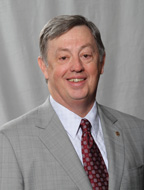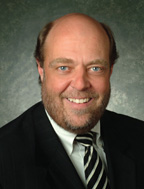
Len Rodman, chairman & CEO
Black & Veatch
It’s not a boast if it’s grounded in fact, and Len Rodman brandishes it with the pride you find in almost any engineering professional in this market: “Kansas City,” he notes, “has more engineers per capita than any metro area in the U.S.” That’s important, he says, because “for every job within the engineering and technical services industry group, an additional two jobs are supported across all sectors of our regional economy.”
The CEO of Black & Veatch leads a company that dominates even within that rarefied atmosphere: B&V’s 2011 revenues of $2.6 billion were more than twice those of the next closest locally based competitor, but the true power behind Black & Veatch is the way it improves life in the community. Rodman can cite multiple examples of that: The federal, state and local taxes it pays, the comparatively high salary structure it supports, the vast network of business-to-business connections.
In Kansas City, home to 3,600 employees out of a total work force of 9,200, “our professionals and their families provide economic value and community-involvement benefits throughout the region.” Those benefits, he said, are the dividends paid by investing in the right values. “Stewardship is one of seven core values we consider as inherent to Black & Veatch,” he said. “Each of us has only a temporary time frame, our career, to impact the company. With stewardship, we want to leave the company in better condition than when we started here.” And that means reaching ever higher. “Many of our new professionals come here because they want to have a measureable positive impact on the world,” Rodman said, but “the other great value professionals find in working here is that they get to work on huge, technically challenging assignments. I often tell new professionals if they want to work on simple stuff, they should find another company.”
Exactly what you might expect from one who sees himself more coach than commandant. “The coach doesn’t score the points; the coach gets the right players on the field and provides order and direction,” Rodman said. “I’ve enjoyed seeing a lot of successful players score a lot of points.”
His value system reflects an upbringing grounded in finding ways to help solve people’s problems, from his mother’s work as a bank officer to his father’s ownership of a lumberyard and various jobs he had working his way through Iowa State University. All taught him value of diversity, considering other points of view and how to compromise and collaborate with others. Further proof of that? He’s been married for 41 years. With those values, plus loyalty and openness, he said, “if you do all these things well and with devotion, you likely will have a rewarding life."

Bob Page, president & CEO
University of Kansas Hospital
He may wield it, but Bob Page doesn’t like to use the word “power.” He likes to think in terms of influence, not brute force. “What speaks volumes,” he says, “is less talk, less rhetoric, more production and more outcomes.” And outcomes are exactly what the CEO at the University of Kansas Hospital is all about. “If you want to have influence, you need to be able to tell others what you’re going to do, deliver on that, and show tangible results correlated to that effort,” he says.
Influence, then, is what he has. Health care is the biggest single slice of the U.S. economy, and in this market, Page’s hospital is the 900-pound gorilla in surgical garb—it had 25 percent more patient admissions in 2011 than the next-closest hospital. His views on what it took to get the hospital to this level—13 years after it was on its own deathbed as an entity—are like a graduate-level course in organizational theory. Call it the Page Corollary: If you want to succeed, culture beats strategy.
“From a value standpoint, to transform an organization in the business we’re in, you’ve got to have a laser focus on patients,” he said. “If we provide the best possible service for every patient that comes to us, and they receive the very best outcome possible from a team that is competent and compassionate and embraces that culture, we’ll be fine from a growth and stability standpoint.”
So market share or reach are by-products, not goals, he says. “If we focus on the business and patients have great outcomes, with the right service for the right patient at the right time, we’ll be fine.” Sure enough, the hospital has recovered during his tenure, thanks to that mission-oriented focus.
A CPA by training, Page arrived at 39th and Rainbow in 1996, when the hospital was approaching financial collapse. He served as vice president of organizational improvement, then chief operating officer, before becoming CEO in 2007. He was part of a team that worked with hospital administration and state lawmakers to create the current governance structure as a public health authority back in 1998, a change paved the way for creating that new culture.
Some of that culture can be traced back to the baseball fields where Page played as a youth. “If I learned anything from that, it was all about teamwork,” he says. “It wasn’t about one individual, it wasn’t about the coaches. It was about nine guys who grew up together, played together every day, supported each other and did the best they possibly could.”
What he loves about KU, he says, is the unbelievable level of confidence matched with humility: “It’s about the executives, the doctors, the nurses—everybody working together.” Which yields a kind of power all its own. “Some folks can’t deliver,” he says, reflecting on what makes a good leader. “But if you’re a transparent, put a plan together, deliver on it and show results, that’s how you influence people.
“People pay attention to people who deliver.”